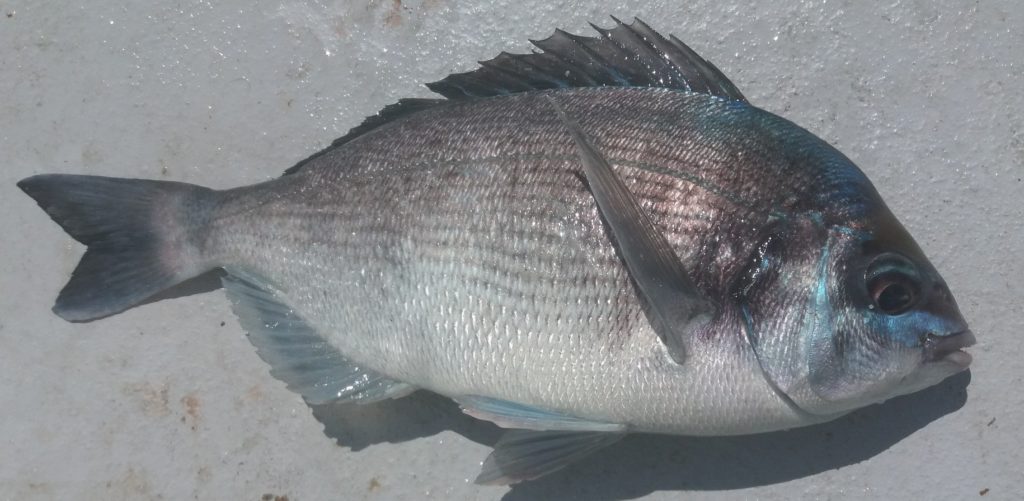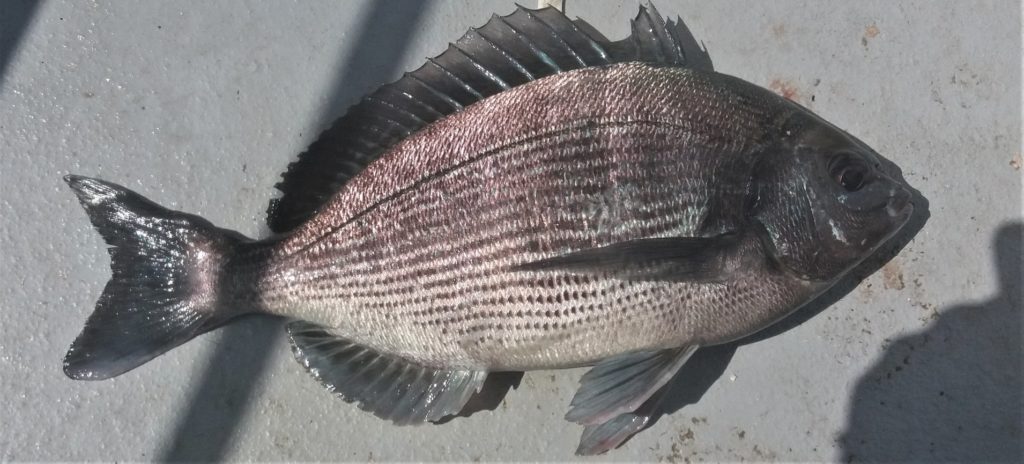Black Bream Fishing
The Black Bream a Culinary Delight
The Black Bream is a firm white fish, with a very distinct flavour. In fact the Black Bream is quite delicious. In the summer months when Black Bream are plentiful, a fresh Black Bream straight onto the barbecue is the perfect dinner to enjoy after a fishing trip. The Black Bream gives anglers plenty of sport and tastes fantastic, a well rewarding fish indeed.
At the time of writing Black Bream stocks are healthy and generally considered sustainable

Black Bream Season
Black Bream start to show mid April and are generally more plentiful and well established by early May. The peak of the Black Bream season happens in July and August. Black Bream tend to disappear the end of September early October. The larger males can be caught in deeper waters, mid-channel wrecks as late as November.
Black Bream Habitat
Black Bream can be found in a variety of habitat, reefs and rough ground, sandy ground, eel grass beds. To target Black Bream it is best to anchor over rocky outcrops or a reef and use ground bait to attract Black Bream. In early autumn the larger Black Bream can be caught on mid-channel wrecks.
Angler’s Edge Fishing Charters operates in an area of the Solent with plentiful marks for Black Bream including Kingmere Reef. Kingmere Reef is a Marine Conservation Zone, with a bag limit for each angler. Anglers can expect some larger size Black Bream here, with 2 to 3 lbs Black Bream not being an uncommon catch.
Scientific name: Spondyliosoma cantharu
Size: Up to 2ft/60cm and 7lbs
UK minimum size: 10ins/23cm
Distribution: Found along the South Coast
Feeds on: Small crustaceans, shellfish, and marine vegetation.

Black Bream Fishing Tactics
Black Bream are shoal fish, they will attack baits with vigour. That said they have small mouths and are capable of easily stripping baits off hooks. Black Bream will put up a huge fight, all the way to the boat.
For this reason it is best and most exciting to fish with light tackle and small hooks.
Ground Baiting
In theory ground baiting seems the way to go. However during the summer months Black Bream are so plentiful it is not necessary to use ground bait. Often Black Bream will take bait intended for larger species and it is not unusual for a Black Bream to take a six o hook. In fact it could be said Black Bream are a pest when targeting other species. It is better to focus on correct fishing technique.
Technique
Keep your equipment as light as possible. A light weight rod and a weight just heavy enough to feel the sea bed. Let the weight find the sea bed then trot the weight back pausing briefly when the weight lands. Generally speaking using this method, the Black Bream will attack your bait. Once you feel the bite gently lift into the fish and keep the rod tip up to apply the right amount of pressure.
Rigs for Black Bream
As stated earlier, at times when the Black Bream are plentiful, it really doesn’t matter what rig you use, they will attack your bait. That said when it comes to rigs, the simpler the better. A two hook paternoster, a running ledger, or a portland rig. With many anglers fishing together on the boat, a simpler rig is much easier to use and untangle.
If you fancy using baited feathers then it is better to cut your rig down to three or four feathers. In areas of marine conservation there are specific regulations for the number of hooks allowed on a rig.
Bait
Black Bream are aggressive feeders and will take almost any bait. Although you will catch on almost anything thrown on a hook, bait presentation is hugely important. You want to be catching consistently and making adjustments. Small baits tidily presented on smaller hooks is extremely effective. Effective baits include, Squid tentacles, small squid strips, rag worm, mackerel strips.
Analysing the Bite to Improve Your Catch
- How far back did the bite occur?
- Which bait got taken
- Which hook did the fish take
- Was the hook stripped
- Bites but no hook up?
- Mark the line, aim for that area/distance again
- Use that bait again
- Refresh your bait and drop back in, you are fishing in a good depth
- Use a slightly larger hook
- Use a smaller hook, these are the very smallest bream and could make good live bait
Black Bream bites can be plentiful and voracious. That doesn’t mean you will be hooking into fish after fish. Sometimes it can be quite frustrating, but analysing your situation can improve your results.